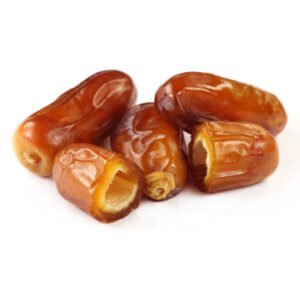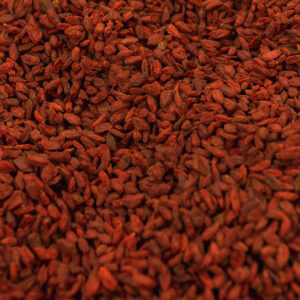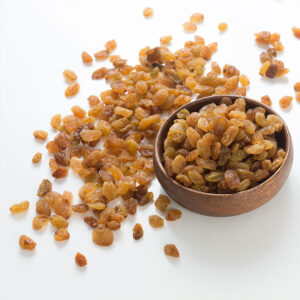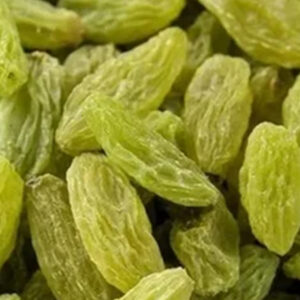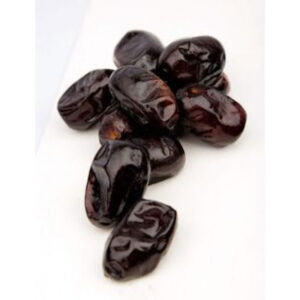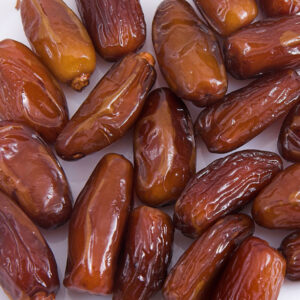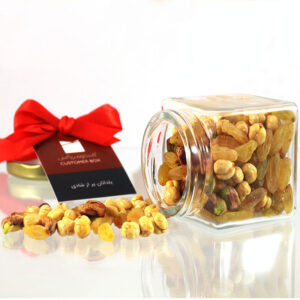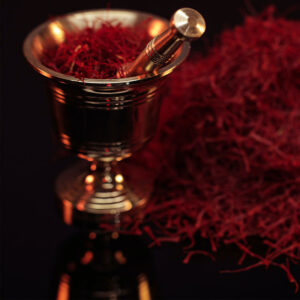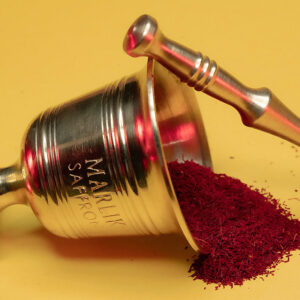Food products
Dates
Golden Kashmari Raisins
Green Kashmari Raisins
Kabkab Dates
Piarom (Mariami) Dates
Raisins
The sultana is a "white" (pale green), oval seedless grape variety also called the sultanina, Thompson Seedless (United States), Lady de Coverly (England), and oval-fruited Kishmish (Iran, Turkey). It is assumed to originate from the Asian part of the Ottoman Empire. In some countries, especially Commonwealth countries, it is also the name given to the raisin made from it or from larger seedless grapes; such sultana raisins are often called simply sultanas or sultanis. These are typically larger than Zante currants (which are actually a kind of dried grape, not currants in the botanical sense), and the Thompson variety is smaller than many seeded raisins. In the USA, the name "raisin" is applied to all dried grapes, so that the breakfast cereal known "Sultana Bran" in Australia and the United Kingdom is called Raisin Bran in the United States. Other types of raisins like Golden, Sundried and etc are coming from different drying process of Sultana raisins.
Another seedless grape variety from the former Ottoman Empire, the round-fruited Kishmish, is also dried to make a larger sultana raisin especially in Iran Empire. Raisins can contain up to 72% sugars by weight, most of which is fructose and glucose. They also contain about 3% protein and 3.7%–6.8% dietary fiber. Raisins, like prunes and apricots, are also high in certain antioxidants, but have a lower vitamin C content than fresh grapes. Raisins are low in sodium and contain no cholesterol.
Data presented at the American College of Cardiology's 61st Annual Scientific Session in 2012 suggests that, among individuals with mild increases in blood pressure, the routine consumption of raisins (three times a day) may significantly lower blood pressure, especially when compared to eating other common snacks.
Production:
1-Washing: In the washing part the raw material (Dried Grape) is double washed and after adjusting the hummidity on heating room goes to sorting and packing part.
2- Sorting and Packing:For sorting raisins Goldenlotus co. uses Laser technology by Laser Sorter Machine (BEST Helius 2015) and X-Ray Machin (BEST IXUS 2015) and finally the cartons pass from Metal Detector for final check.
Sun dried raisin is called to ripened fruit of different varieties of grapes which is being dried in direct sunlight and natural air flow and without adding any material; it turns to brown in this process. Temperature and humidity of the environment during the drying process is an important factor which directly affects the quality of product. These kinds of raisins are available in types of seeded and seedless.
Saffron
Saffron is a plant. The dried stigmas (thread-like parts of the flower) are used to make saffron spice. It can take 75,000 saffron blossoms to produce a single pound of saffron spice. Saffron is largely cultivated and harvested by hand. Due to the amount of labor involved in harvesting, saffron is considered one of the world's most expensive spices. The stigmas are also used to make medicine. The Saffron plant is a member of the crocus family, which is cultivated for the sake of the stigmas of its flowers. Saffron is extremely expensive because it takes almost 13,000 stigmas hand-picked and dried from 4,300 flowers to make an ounce (28 g) of Saffron. People don't wander the hills and dales, though, looking for a flower here and a flower there: the Saffron crocuses are cultivated 6 inches (15 cm) apart in rows in huge fields. Anti-Cancer Benefits Research has indicated that Crocin, Safranal and Picrocrocin from saffron may be involved in ant-cancer activity by inhibiting the growth of human cancer cells in vitro. Storage: Store in an airtight container in a dark, cool, dry place. After 6 months, the threads will start to weaken in flavor.


